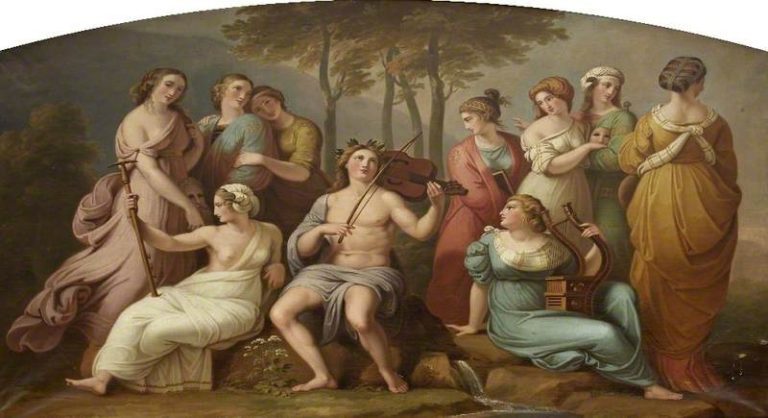Plato, Music, and Possession
Mar. 2nd, 2023 09:17 am
Socrates and the Rhapsode
Plato's Ion is a dialogue between Socrates and Ion, a rhapsode. Rhapsodes, in ancient Greece, were traveling musicians who performed the work of poets such as Homer or Hesiod.
Ion tells Socrates that he speaks better of Homer and has more to say about him than about any other man. Why is this, he wonders? Socrates explains:
The gift which you possess of speaking excellently about Homer is not an art, but, as I was just saying, an inspiration; there is a divinity moving you, like that contained in the stone which Euripides calls a magnet... This stone not only attracts iron rings, but also imparts to them a similar power of attracting other rings; and sometimes you may see a number of pieces of iron and rings suspended from one another so as to form quite a long chain: and all of them derive their power of suspension from the original stone. In like manner the Muse first of all inspires men herself; and from these inspired persons a chain of other persons is suspended, who take the inspiration. For all good poets, epic as well as lyric, compose their beautiful poems not by art, but because they are inspired and possessed. And as the Corybantian revelers when they dance are not in their right mind, so the lyric poets are not in their right mind when they are composing their beautiful strains: but when falling under the power of music and meter they are inspired and possessed; like Bacchic maidens who draw milk and honey from the rivers when they are under the influence of Dionysus but not when they are in their right mind. And the soul of the lyric poet does the same, as they themselves say; for they tell us that they bring songs from honeyed fountains, culling them out of the gardens and dells of the Muses; they, like the bees, winging their way from flower to flower. And this is true. For the poet is a light and winged and holy thing, and there is no invention in him until he has been inspired and out of his senses, and the mind is no longer in him: when he has not attained to this state, he is powerless and is unable to utter his oracles.
Notice, again: A true poet is not an inventor, but the subject of a divine possession. And in a case of a truly great poet like Homer, he forms a first link in a great chain of possession which extends to everyone who hears his words and finds themselves enraptured by them. Ion is a link in the chain.
The Unbroken Chain
The Ion is a great example of why you should always ignore whatever introduction appears before the dialogue in your copy of Plato, unless the introduction was written by Thomas Taylor. The introduction to my copy of the Ion helpfully explains that the whole thing is a joke; Plato is just screwing around. Don't believe it. You only need to watch the way that psychic forces move through musicians and music to understand what he is talking about.
Here is a contemporary example:
He was mesmerizing. I watched his face, his hands, the way he tapped his foot, his big black glasses, the eyes behind the glasses, the way he held his guitar, the way he stood, his neat suit. Everything about him. He looked older than twenty-two. Something about him seemed permanent, and he filled me with conviction. Then, out of the blue, the most uncanny thing happened. He looked me right straight dead in the eye, and he transmitted something. Something I didn’t know what. And it gave me the chills.
The writer of these words is Bob Dylan, and he is describing his first experience seeing Buddy Holly in concert. Soon afterward, note well, Buddy Holly died in a freak plane crash. And Bob Dylan went on to become, as they say, the voice of his generation, as the force which had possessed Buddy Holly went on to speak through him bring about great changes in our cultural landscape which, for better or for worse, endure to this day.